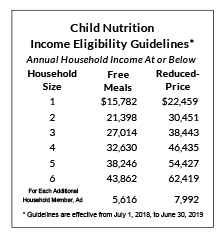Contact
Tom McCarthy, DPI Communications Director, (608) 266-3559MADISON — Each year, the U.S. Department of Agriculture (USDA) Food and Nutrition Service uses federal poverty information to update income eligibility guidelines for meals served at schools and day care programs.
The income guidelines began July 1 and will remain in effect until June 30, 2019. The guidelines apply to student eligibility for free and reduced‑price school meals offered through the National School Lunch or School Breakfast Programs and milk offered through the Special Milk Program as well as to reimburse for meals served in day care centers and family child care homes participating in the Child and Adult Care Food Program.
The guidelines establish that students in a household with annual income that is 130 percent of the federal poverty level, or $32,630 or less for a family of four, qualify for free meals. If that same family has yearly income that is at or below $46,435 (185 percent of federal poverty level) children are eligible for reduced-price meals. The state’s participating public and private schools and day care centers typically provide applications for free and reduced‑price school meals during registration and in the beginning weeks of the school year. However, applications may be submitted at any time. Only one application is required per household.
“Food served to students contributes directly to the academics of a school or day care program,” said State Superintendent Tony Evers. “Our kids can’t learn when they are hungry. Wisconsin’s dedicated nutrition professionals provide quality, well-balanced meals every school day through the federal school and day care meal programs, building positive relationships around food and nutrition.”
Based on family circumstances, certain groups are automatically eligible to receive meal benefits, with eligibility based on program specifics. Those groups include children and adults who participate in or receive benefits from the following programs: Supplemental Nutrition Assistance Program (SNAP) or FoodShare in Wisconsin, Temporary Assistance for Needy Families (TANF) or Wisconsin Works (W-2) Cash Benefits in Wisconsin, some programs under Medicaid, and Food Distribution Program on Indian Reservations (FDPIR). Foster, homeless, migrant, or runaway children; children who are enrolled in Head Start, an At-Risk after-school center, or an emergency shelter; and adults who are Supplemental Security Income (SSI) or Medicaid participants also are eligible.
All students are eligible to eat school meals in public and private schools that participate in the National School Lunch or School Breakfast programs. To receive the meals for free or reduced‑price, parents or guardians complete a form, providing the names and income from all sources for all household members. All information is kept confidential. Most day care centers and all family child care homes that participate in the Child and Adult Care Food Program provide meals to all enrolled participants without any separate charge. Reimbursement to the center or child care home for meals is based on household incomes of those enrolled for care. A list of the day care centers in Wisconsin that participate in the Child and Adult Care Food Program is available online.
The goal of both school-based and child care food programs is to improve the diets of students and young children and increase the opportunity for them to eat a variety of nutritious foods. The meals and snacks served meet nutrition standards set by the USDA.
As an agency administering USDA programs, the Wisconsin Department of Public Instruction is prohibited from discriminating on the basis of race, color, national origin, sex, disability, age, or reprisal or retaliation for prior civil rights activity. The full USDA nondiscrimination statement can be found on the department’s nutrition website.